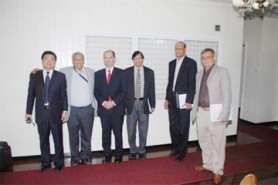After a recent, successful feasibility expedition conducted in the Rupununi by Soil Net Limited, a Chinese company, the investors have decided to continue with their plan for large scale cassava farming.

A Government Information Agency (GINA) press release yesterday said the “fact finding mission on the feasibility of large-scale cassava farming at Pirara Ranch in the North Rupununi” was successful. Following the expedition the group met with President Bharrat Jagdeo and Minister of Agriculture Robert Persaud.
Vic Oditt, proprietor of Pirara Ranch, led the recent “fact finding mission”. The mission’s team included Dr. Aicardo Roa-Espinosa, President of Soil Net Limited; and Liang Guotao, Chief Engineer of the General Machinery Engineering Department of the China National Heavy Machinery Corporation.
After the meeting at the president’s office, GINA reported, Espinosa said Pirara Ranch “would be a great place to develop cassava farming”.
Espinosa described cassava as an “easy crop; a crop that is rustic” and said that Guyana’s soil and water create a good environment for cultivation.
“Cassava is one of the crops that can produce bio-energy; ethanol for use in gasoline and it is a crop that be used as a source of food,” Espinosa said.
With the successful completion of the feasibility expedition, Espinosa indicated, “the next step will be to develop the plan for the project with their Chinese partner” who will be responsible for “building all the machinery”.
Espinosa, GINA further said, mentioned the support his team is receiving from Jagdeo and will be returning here shortly to further develop the cassava cultivating plan.





